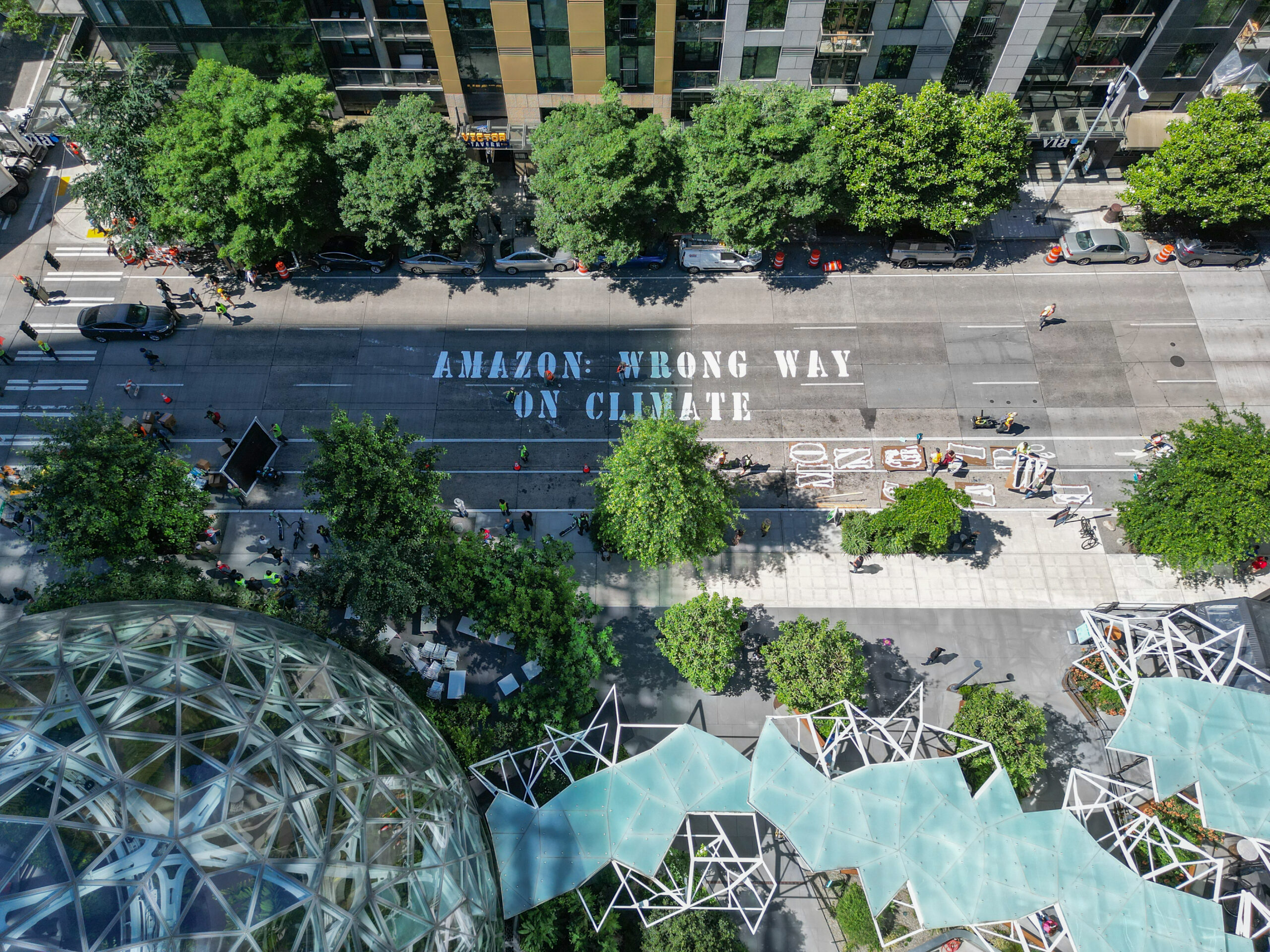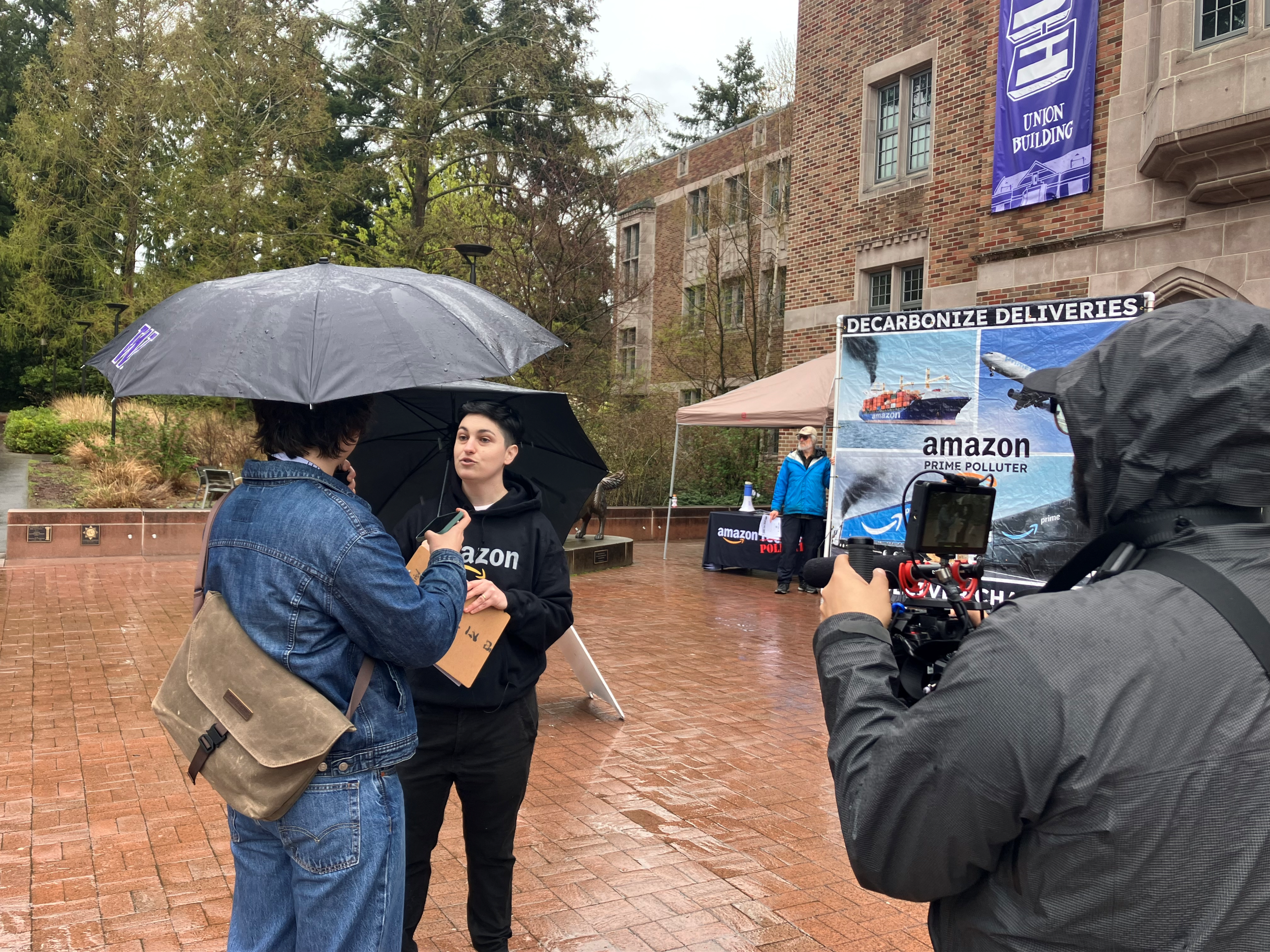


SEATTLE — As Amazon celebrated its annual Prime Day sales event, protestors gathered outside its Seattle headquarters on Tuesday to send a message to Amazon executives that the company is going the wrong way on harmful climate emissions.
Led by environmental advocacy groups including Stand.earth and the Ship It Zero coalition, climate and community advocates called on the company to announce a commitment to transition its maritime and land-based shipping and logistics to zero-emissions alternatives, and to release a science-based roadmap toward implementation that aligns with limiting global warming to 1.5 degrees Celsius.
Shutting down Sixth Avenue in front of Amazon’s headquarters, the demonstration was planned to include installation of a street mural, however efforts were disrupted by an aggressive response from local police that resulted in the arrest of at least one person. Demonstrators were able to stencil their core action message — “Amazon is going the wrong way on climate” — before police intervened by driving through the area where they were working on Sixth Avenue.
A 1,200-square-foot banner bearing the same message was also on display. While at the company’s headquarters, representatives from Stand delivered a letter to Amazon CEO Andy Jassy outlining steps the company needs to take to correct course and align with the latest science on climate change.
- Photos and videos of the demonstration are available in this folder.
Released last week, Amazon’s latest sustainability report confirms the company is moving in the wrong direction toward increased pollution, having increased its Scope 1 emissions, including transportation, by 7% over 2022. Since announcing its Climate Pledge in 2019, Amazon’s Scope 1 emissions have grown at a staggering compound annual growth rate of 25.5%.
“The shipping industry is a significant contributor to climate change,” Stand.earth Organizing and Campaigns Director Logan McIntosh said. “Despite its climate promises, Amazon continues to grow its land- and air-based emissions. It is imperative that the company’s leadership communicate the true impact of its fossil-fuel trucks, vans, and planes, and waste no further time in shifting substantial investment toward a rapid transition to zero-emission deliveries.”
Recent research published by Stand last month identified Amazon as one of the fastest growing air shippers and revealed the company has more than doubled emissions in its air freight operations in the five years since adopting its Climate Pledge. Amazon also has made no meaningful progress on promises to adopt a combined 100,000 electric vehicles by 2030, and that target alone fails to account for projected fleet growth from continued e-commerce sector expansion.
As with its air and ground shipping commitments, the company has offered long-term promises but shown little progress on implementation in the marine shipping sector. Ocean shipping has significant impacts on portside communities and more than 39 million people live within three miles of a port, mostly lower-income residents and people of color. Maritime emissions cause 265,000 premature deaths and 6 million cases of childhood asthma each year. Amazon is a prime polluter when it comes to ocean shipping; last year, Amazon scored a “D” grade in the Ship it Zero campaign’s Report Card. Amazon has also failed to offer solutions to end port pollution and neglected the public health impacts of its fossil fuel ships, which are often left to idle in ports.
“We are in Seattle today calling on Amazon executives to put their goods on zero-emissions ocean ships by 2030,” Ship It Zero spokesperson Shannon Wright said. “Amazon is heading the wrong way on climate and public health. We are asking this prime polluter to turn their transportation and logistics emissions around. It’s time for Amazon to stop using fossil fuels in ships, vans, trucks and planes. Shipping pollution accounts for more than 3% of global climate emissions. Amazon is one of the world’s largest shippers of goods across the Pacific Ocean. The message is clear: Amazon must be a climate leader and Ship It Zero.”
Air pollution is known to cause significant health defects worldwide, and a joint investigation published by Stand and the Clean Mobility Collective last year found that without any changes in fleet makeup, e-commerce companies’ last-mile emissions were projected to contribute up to 168,000 cumulative cases of asthma exacerbation, up to 285,000 cumulative cases of respiratory symptoms, and up to 9,500 premature deaths between 2023 and 2030.
“It’s critical that Amazon is held accountable for the damage its shipping and logistics network is causing in frontline communities,” said Dr. Christopher J. Covert-Bowlds, a board member and Climate and Health Task Force member of Washington Physicians for Social Responsibility. “For more than 20 years, I’ve been treating asthma, bronchitis, and other respiratory ailments as a family medicine physician in Seattle. I have seen firsthand the damage that respiratory illness can do to a person’s quality of life. Study after study shows that proximity near last-mile fulfillment centers are associated with higher concentrations of heavy metal and other pollutants associated with higher incidence rates of these illnesses.”
Amazon leaders have an opportunity to Deliver Change and lead the e-commerce sector toward alignment with climate targets by committing to zero-emissions last-mile deliveries by 2030. Stand and partners are working to engage the company in good-faith conversations to chart a science-based pathway toward climate progress.
###
Ship It Zero is a climate and public health campaign to move the world’s largest companies to 100% zero-emissions ocean shipping. It urges companies such as Walmart, Home Depot, Amazon, Target and IKEA — to transition to 100% zero-emissions cargo shipping vessels by 2030. This goal will ensure the shipping industry does its fair share in helping to keep global warming under 1.5 degrees Celsius, the target scientists say is needed to avoid the worst consequences of the climate crisis.
Media contact:
Jared Saylor, Senior Director of Communications, Pacific Environment, jsaylor@pacificenvironment.org

Recent Updates





